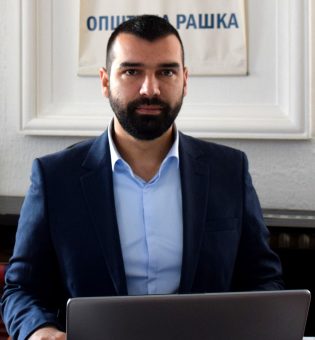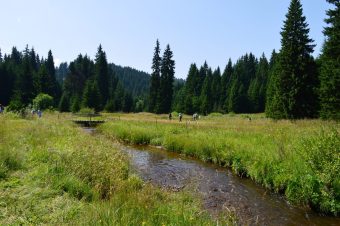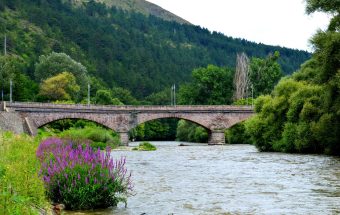
Raška, a small town in the southwest of Serbia, situated between the mountains of Kopaonik and Golija, on the rivers Ibar and Raška, works efficiently to preserve the environment.
This municipality is one of the leaders in the district in terms of the number of subsidized solar power plants for private use, and it is working on establishing a regional waste management system and plans to invest in improving energy efficiency in the coming period. We spoke with Nemanja Popović, the Mayor of the municipality of Raška, about subsidies for solar power plants, air quality control, remediation of landfills, and wastewater processing, as well as plans for investments in environmental issues in the coming period.
Q. Last year, the Ministry of Mining and Energy and the municipality set aside 28 million dinars for subsidies for private-use solar power plants. How big is the interest in these subsidies, what are the plans, and when will the other public calls be launched?
A. The state’s strategic determination is to implement a responsible energy policy and work on improving energy efficiency following domestic legislation and EU directives. Energy policy programmes are implemented to boost energy efficiency. The effects of such measures are multiple and long-lasting and contribute to the safety of the electricity supply, the industry’s competitiveness, the increase in the population’s living standard and the reduction of the negative impact of energy on the environment. With the support of the line ministry, the Raška municipality started to implement the first energy rehabilitation measures in 2021 to improve the energy-related features of residential buildings, save energy and reduce heating costs.
A total of 17 million dinars was earmarked to implement three measures: procurement and installation of thermal insulation materials, procurement and installation of windows and exterior doors with accompanying construction works, and procurement and installation of biomass boilers/stoves. The Ministry allocated 5 million dinars to the municipality of Raška, while 12 million dinars were allocated from the local budget. At that time, 208 beneficiaries—205 owners of family houses and apartments and three housing associations—were eligible for financial support. The Solar Panel Installation Programme was given almost six million dinars in the same year, and 14 citizens opted for this type of support. A year later, 240 owners of apartments and family houses signed contracts on the allocation of subsidies for boosting energy efficiency. The Ministry of Mining and the Municipality of Raška allocated nearly 28 million dinars to implement the programme. Another 7 million dinars have been earmarked for installing solar panels—the Ministry of Mining and the municipality gave 3.5 million dinars each. A competition for the allocation of subsidies for the installation of solar panels is underway.
IN FOCUS:
- SUBSIDIES FOR NEW GREEN VEHICLES
- HOW TO DEVELOP ELECTROMOBILITY IN SERBIA FASTER?
- RENEWABLE SOURCES KEY TO ENERGY SECURITY
Q. What is the situation in the municipality of Raška regarding air pollution? What kind of air do people breathe, and how is the air quality measurement control performed considering there is a developed industry there and households that use solid fuel for heating?

A. The only official air quality measuring station on the municipality’s territory is located in the Kopaonik National Park (more than 34 km from the town centre), where SO2 (sulfur dioxide) and O3 (ground ozone) are monitored, and the data are published on the website of the Environmental Protection Agency. In the last month, there were no violations of the monitored parameters. Since there is no measuring point within the state air quality monitoring grid in other parts of the municipality, nor has local monitoring been established, it is impossible to reliably determine whether the prescribed limit values of air pollutant emissions are exceeded in any area. We can assume that pollution exists, especially in winter, and that home fireplaces cause it. The local government participated in the project to replace the fireplaces in households, so I hope that the residents of Raška will also have better-quality air in the winter months. The industrial zone is separated from the residential one, and possible pollutants are subject to the control of the environmental protection inspection. In the case of industrial companies, regular air pollution measurements are carried out according to the law and emissions are controlled within the prescribed permitted values. The municipality of Raška does not have a heating plant, and the main road does not pass through the town centre, but it detours in the direction of Kosovska Mitrovica and Novi Pazar. That is why monitoring of the air pollution emission has not been established.
Q. What is the municipality doing to rehabilitate landfills, what has been done so far and what are the plans? How do you plan to solve the problem of solid waste disposal?
A. Waste management on the municipal territory is not carried out following the prescribed standards because the collected municipal waste is disposed of in an unsanitary landfill, which is also designated as a landfill for the disposal of construction waste and, as such, is a major environmental risk. According to the 2010-2019 Waste Management Strategy, together with the municipalities of Vrnjačka Banja and Tutin and the towns of Novi Pazar and Kraljevo, Raška was included in the waste management region. In the meantime, activities have been carried out to establish a regional waste management system for the municipalities of Raška and Tutin and the town of Novi Pazar, which form a waste management region according to the 2022-2031 Waste Management Programme in the Republic of Serbia. The conceptual project titled “Remediation, closure and recultivation of the existing unsanitary solid waste landfill in the municipality of Raška” was carried out by the Architectural and Construction Institute from Novi Sad in 2019. There is also a project that stipulates issuing a building permit for the construction of a Recycling Centre in Raška at KP 1/41 KO Raška, in the Razdolje location.

In the Batnjik area, halfway along the course of the Raška River from Novi Pazar to Raška, a net dam was installed in 2017, which prevents plastic bottles, bags and other packaging waste from floating down the river. The dam is located on a narrow stream of the riverbed. It is built of high-quality stainless steel that is 100 per cent environmentally friendly and does not damage the river ecosystem. The packaging waste collected in this way is then reused, thanks to the recycling industry.
The Raška Public Utility Company (JKP Raška) installed special bins for ash disposal in several locations, ensured the free removal of bulky waste according to the established schedule and installed larger containers in places with a higher frequency of garbage disposal. In the last twenty years, the relevant municipal services and PUC Raška have regularly removed landfills and recultivated the terrain. In cooperation with the line ministry, large landfills were rehabilitated years ago in the municipality of Raška. Certain areas are covered by video surveillance to establish an additional supervision system and help with penalizing those individuals or companies who damage the environment through their negligent behavior. Despite all the activities aimed at environmental protection, requests and appeals sent out by the relevant services and environmental associations, we are still witnessing the emergence of new illegal landfills, which spoil the environment and pollute the land, water and air. Suppose we all preserve nature, park areas, promenades and riverbanks, i.e. everything that is recognizable and characteristic of Raška. In that case, we will have a more beautiful town and higher quality of life. I would like to believe that all residents love Raška equally and that we want the town to have a clean and orderly environment. Nature has been generous to our town and its surroundings. It is up to us whether we will succeed in fighting bad habits and persevere in our intention to leave a healthy environment for generations to come.
Interviewed by: Mirjana Vujadinović Tomevski
Read the story in the new issue of the Energy portal Magazine ELECTROMOBILITY


